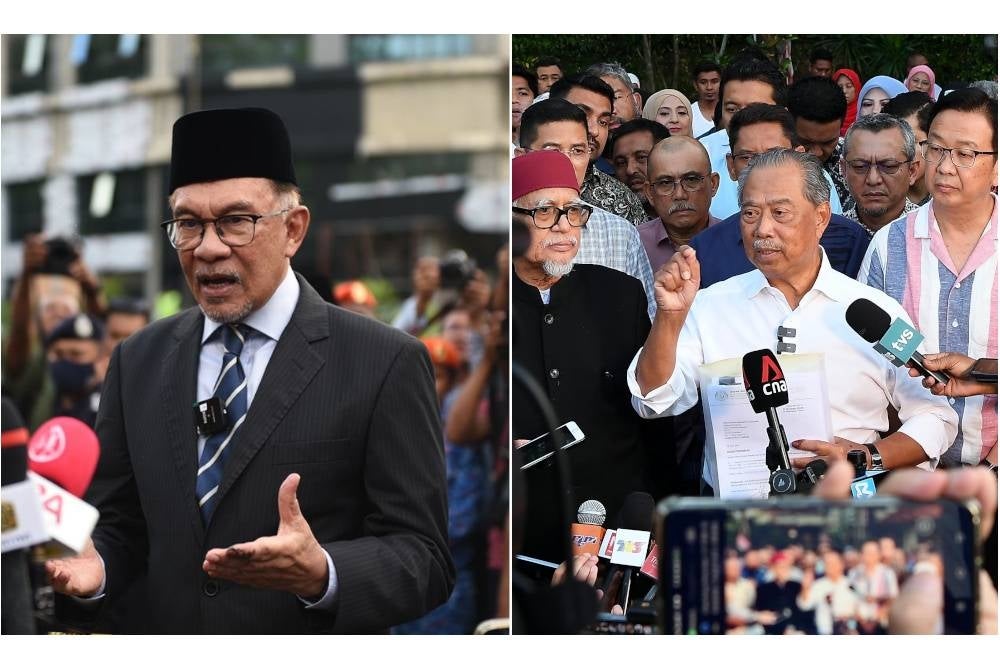Unity, minority or caretaker government
MOHD FAIZUL HAIKA MAT KHAZI
SHAH ALAM - The failure of any political alliance to gain the support of most members of Parliament to form a government after the 15th General Election (GE15) allows three situations to occur namely a minority, unity or caretaker government.
Constitutional expert Datuk Professor Dr Wan Ahmad Fauzi Wan Hussain said if none of the MPs can get a majority, then an MP could bring the offer of a minority government with a conditional support through a Confidence and Supply Agreement (CSA).
A CSA is a written agreement between a party or several MPs with the minority government regarding any vote of confidence, important bill, supply vote or the budget that would be tabled and the decision would be through a voting process in the Dewan Rakyat later.
In GE15 last Saturday neither Pakatan Harapan (PH), Perikatan Nasional (PN) nor Barisan Nasional (BN) won a simple majority of at least 112,
PH won 82 seats followed by PN with 73 seats, while BN only won 30 Parliamentary seats -- the latter has decided not to support any coalition.
Gabungan Parti Sarawak (GPS) with 23 Parliamentary seats had made an open statement in support of PN and leave it to the wisdom to the Yang di-Pertuan Agong Al-Sultan Abdullah Ri’ayatuddin Al-Mustafa Billah Shah to appoint the new prime minister.
The next was the caretaker or the temporary government led by the current Caretaker Prime Minister Datuk Seri Ismail Sabri Yaakob.
In this form, no new policy decisions can be made even though it could still advise the Yang di-Pertuan Agong in matters of national administration.
A similar situation happened in Belgium in 2010 to 2011 when the Belgian government continued to govern for 589 days without an elected government, more than a year after general elections were held in June 2010.
Fauzi stated in the current situation there were no terms for a hung government because the caretaker government led by Ismail Sabri is still functioning as usual even though with limited powers.
The Universiti Malaysia Pahang (UMP) did not reject the possibility that PH and PN would form a unity government if the leaders of both coalitions reached an agreement after meeting the Agong at Istana Negara on Tuesday evening.
“Datuk Seri Anwar Ibrahim may also be appointed as prime minister to the PN-PH unity government if Muhyiddin Yassin agrees because the PH coalition has the most seats in Parliament.
“However, it is not impossible that Pas president Tan Sri Abdul Hadi Awang will be appointed to lead the unity government if Anwar and Muhyiddin agree because Pas is the party that won the most seats with 49,” he said to Sinar Premium.
Anwar after being summoned to appear before the Yang di-Pertuan Agong insisted that so far nothing had arisen about the formation of a minority government.
He said as of now there had been no decisions that involved the appointment of prime minister.
The Yang di-Pertuan Agong previously informed that no Dewan Rakyat members gained the simple majority.
Fauzi had not rejected the possibility that the Agong would take a drastic measure in appointing any Dewan Rakyat member whom he deemed has a majority support to become the prime minister and form the Cabinet to help govern the country.
This was due to the Agong is the only one who could appoint a Dewan Rakyat member to become the prime minister regardles who gained the majority.
“What His Majesty needed to do was to elect a prime minister who he thinks could gain the trust of majority of the Dewan Rakyat members. Whether His Majesty’s opinion is correct or not is only a matter after appointing the prime minister.
“The prime minister then needs to have the confidence of the majority to lead the government either by bringing a motion of confidence to the Dewan Rakyat when the 15th Parliament convenes within 120 days from the date of its dissolution, by reaching an understanding with the opposition, or forming a unity government,” he said.












